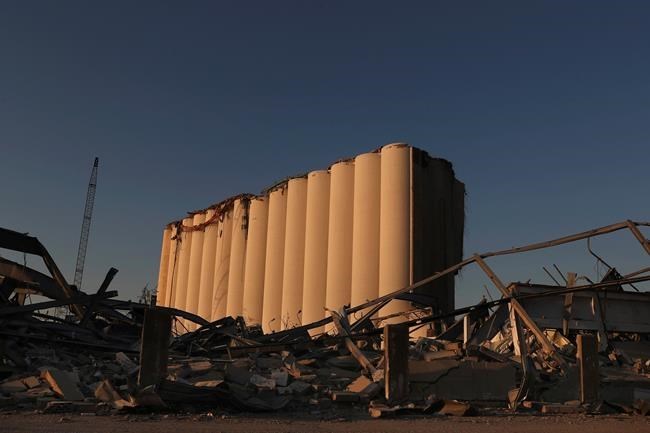
A damaged grain silo is surrounded by rubble and debris at the site of the Aug. 4 explosion that killed over 100 people, injured thousands and caused widespread destruction in the seaport of Beirut, Lebanon, Monday, Aug. 24, 2020. (AP Photo/Bilal Hussein)
August 25, 2020 - 9:02 AM
BEIRUT - Lebanon's central bank governor warned in an interview published Tuesday that the bank cannot continue using its foreign currency reserves to finance trade, signalling he may soon be unable to sustain subsidies on basic goods.
In an interview with the French edition of the Saudi-owned Arab News, Riad Salameh said the central bank “is not the state” and cannot be blamed for everything.
“We have laid out the situation well in advance. Let those in charge take the necessary measures,” he said in the interview.
Salameh said once the bank reaches the minimum threshold of these reserves, it will be forced to stop funding subsidies.
The bank is believed to have around $18 billion in foreign currency reserves — down from $20 billion in April — which it has been using to support basic imports of fuel, wheat and medicine at a stable price after the currency collapse. Reports have suggested Salameh informed the government it would need to stop this support when reserves reach $17.5 billion.
Salameh, who has held the post since 1993, has come under scathing criticism by many who hold him — along with the country's ruling class —responsible for Lebanon's severe financial crisis and collapse of the national currency which started late last year. The currency has lost about 70% of its value on the black market since the beginning of the year, with the rapid devaluation fueling inflation and plunging tens of thousands of people into unemployment and poverty.
Salameh has deflected blame and said he did what he had to do to maintain Lebanon's monetary stability in the face of various crises over the past years. He blames politicians for reneging on repeated promises of reform.
The government has resigned in the wake of the Aug. 4 catastrophic explosion at Beirut port that killed and wounded thousands of people and caused widespread damage to the facility and parts of the capital estimated to be between $10-$15 billion.
News from © The Associated Press, 2020